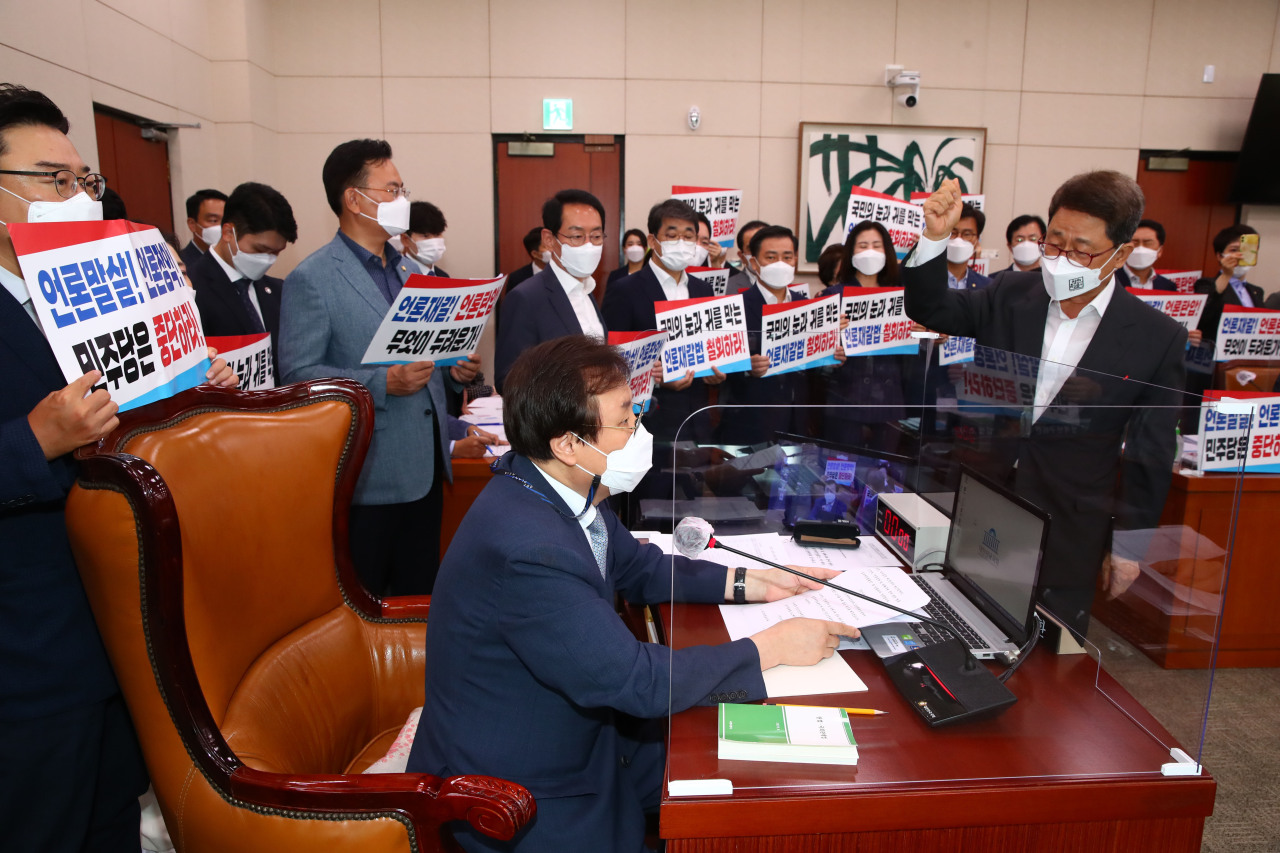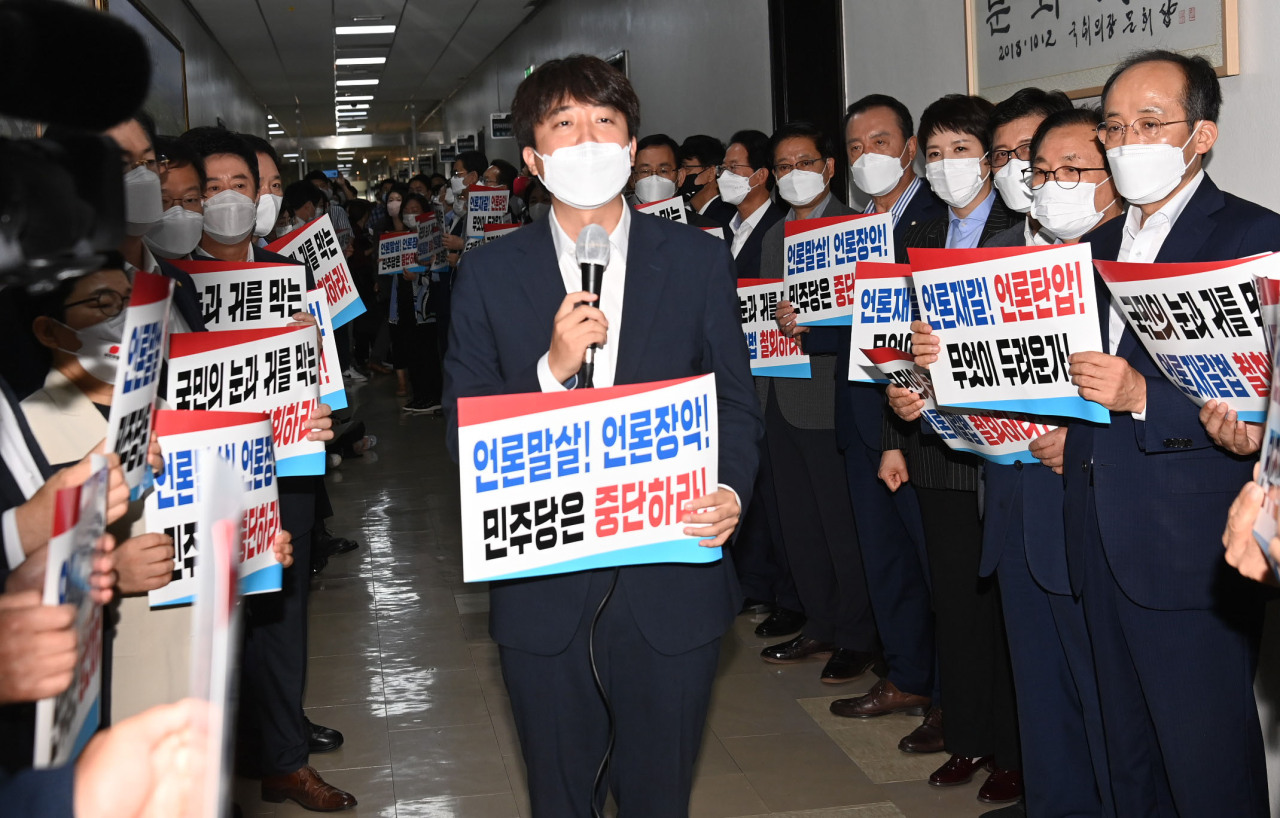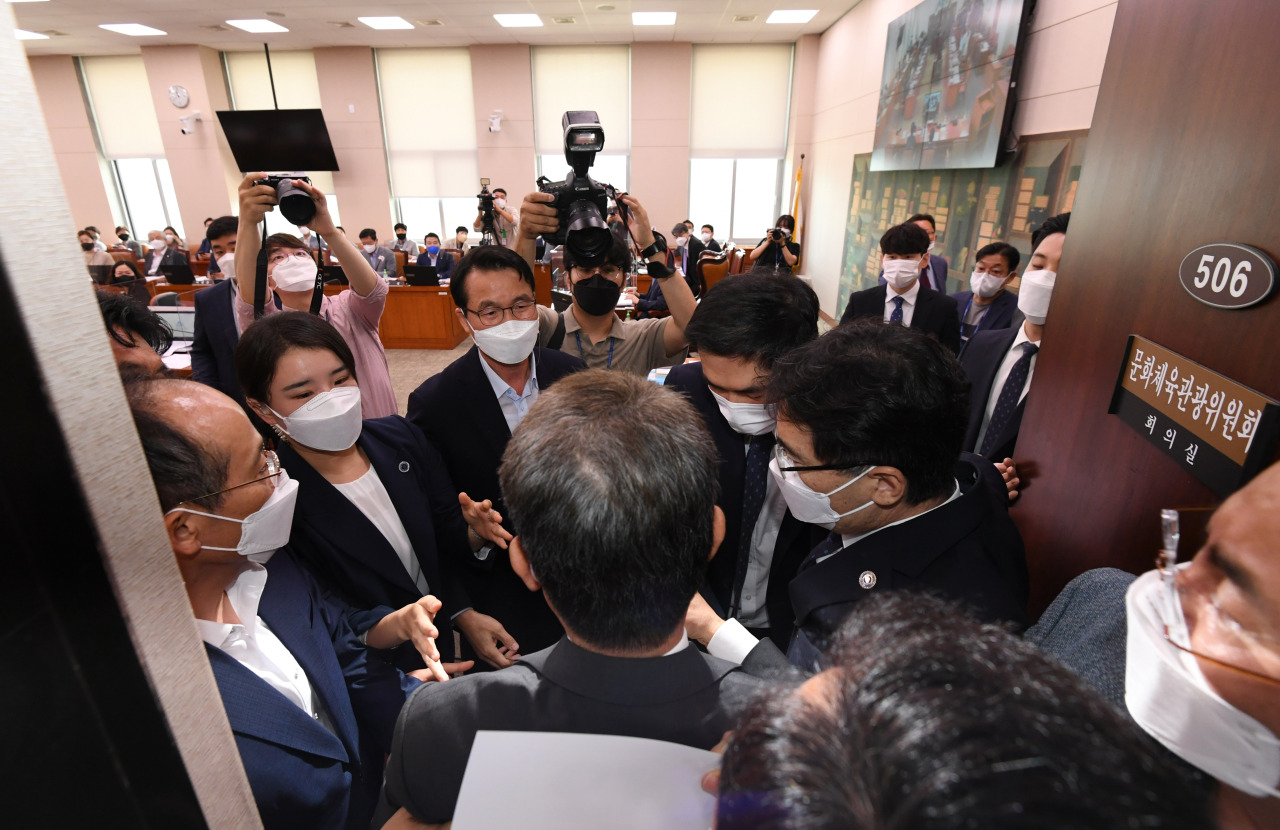[News Focus] Controversial ‘fake news’ bill draws closer to legislation
Ruling party’s bill to penalize journalists for “fake news” criticized for limiting freedom of press
By Ko Jun-taePublished : Aug. 19, 2021 - 15:19

A bill backed by the ruling Democratic Party of Korea that would penalize media outlets and journalists for producing “fake news” was approved by a parliamentary committee Thursday, taking it another step closer to becoming law.
It is likely the proposed revision to the Press Arbitration Act will be put to a final vote and passed during a plenary session Wednesday, as the ruling party controls about 60 percent of the National Assembly’s 300 seats.
The bill, which the ruling party has defended as a way to protect the public from misinformation, has been fiercely opposed by opposition lawmakers and the media who say it risks undermining press freedom and curbing criticism of the ruling party ahead of the upcoming elections.
Under the revised act, people harmed by intentional "fake news" reports could file for punitive damages amounting to five times the actual financial damage they incur.
Ruling party lawmakers have said they intend to enact the bill as soon as possible, saying too many people have experienced harm due to misinformation and malicious media reports.
Rep. Lee Byung-hoon of the ruling party said that currently people can only claim up to 5 million won ($4,250) in damages from media outlets and journalists for false reporting, which is not enough to protect the public from malicious news reports.
The number of false news reports could drop sharply if that amount increased fivefold, ruling party lawmakers say.
"We have keenly listened to the opinions of opposition lawmakers and those in the media sector with an emphasis on minimizing the damage from fake news and providing as much protection as possible," said the Democratic Party floor leader, Rep. Yun Ho-jung, in a meeting Thursday.
It is likely the proposed revision to the Press Arbitration Act will be put to a final vote and passed during a plenary session Wednesday, as the ruling party controls about 60 percent of the National Assembly’s 300 seats.
The bill, which the ruling party has defended as a way to protect the public from misinformation, has been fiercely opposed by opposition lawmakers and the media who say it risks undermining press freedom and curbing criticism of the ruling party ahead of the upcoming elections.
Under the revised act, people harmed by intentional "fake news" reports could file for punitive damages amounting to five times the actual financial damage they incur.
Ruling party lawmakers have said they intend to enact the bill as soon as possible, saying too many people have experienced harm due to misinformation and malicious media reports.
Rep. Lee Byung-hoon of the ruling party said that currently people can only claim up to 5 million won ($4,250) in damages from media outlets and journalists for false reporting, which is not enough to protect the public from malicious news reports.
The number of false news reports could drop sharply if that amount increased fivefold, ruling party lawmakers say.
"We have keenly listened to the opinions of opposition lawmakers and those in the media sector with an emphasis on minimizing the damage from fake news and providing as much protection as possible," said the Democratic Party floor leader, Rep. Yun Ho-jung, in a meeting Thursday.

Minor adjustments were made during the bill's passage through the National Assembly's Culture, Sports and Tourism Committee, which the ruling party has claimed constitutes compromise, but there have not been any open discussions or negotiations.
Ruling party lawmakers on the National Assembly’s Culture, Sports and Tourism Committee passed the bill at a Thursday meeting despite fierce resistance from opposition lawmakers.
The Democratic Party controls nine out of 16 seats on the committee, with the main opposition People Power Party holding the remaining seven.
People Power Party Chairman Lee Jun-seok staged a protest inside the National Assembly on Thursday ahead of the vote by the parliamentary committee, with lawmakers opposing the bill holding signs saying the Democratic Party should stop trying to kill the media.
The bill passed a vote by a culture subcommittee a day earlier, with four lawmakers from the ruling party and its sister affiliate voting in favor while two from the main opposition People Power Party voted against.
Opposition lawmakers have criticized the bill for effectively being a legislative weapon for the ruling party to control what can be published by media outlets ahead of the presidential election next year.
The bill contains vocabulary that cannot be applied with objective standards in verifying violations, they say, meaning it could serve as a tool for the government and corporations to file lawsuits even for reasonably written critical reports.
Ruling party lawmakers on the National Assembly’s Culture, Sports and Tourism Committee passed the bill at a Thursday meeting despite fierce resistance from opposition lawmakers.
The Democratic Party controls nine out of 16 seats on the committee, with the main opposition People Power Party holding the remaining seven.
People Power Party Chairman Lee Jun-seok staged a protest inside the National Assembly on Thursday ahead of the vote by the parliamentary committee, with lawmakers opposing the bill holding signs saying the Democratic Party should stop trying to kill the media.
The bill passed a vote by a culture subcommittee a day earlier, with four lawmakers from the ruling party and its sister affiliate voting in favor while two from the main opposition People Power Party voted against.
Opposition lawmakers have criticized the bill for effectively being a legislative weapon for the ruling party to control what can be published by media outlets ahead of the presidential election next year.
The bill contains vocabulary that cannot be applied with objective standards in verifying violations, they say, meaning it could serve as a tool for the government and corporations to file lawsuits even for reasonably written critical reports.

"If this bill passes, it will be used as a strategic blockade by large corporations, politicians and public officials against media reports," Rep. Kim Yea-ji of the People Power Party said Wednesday. "And this will bring a serious threat to people’s right to know."
The media sector has also openly criticized the bill, asking for a comprehensive review of whether it was really designed protect the public from misinformation and to promote a healthier media environment.
"We agree that people and users’ damages need to be compensated and that amount to be strengthened from misinformation and fabricated reports amid a rapidly changing media environment," the Journalists Association of Korea said in a statement last week.
"But the bill pushed by the Democratic Party of Korea is likely to fail its goal of compensating for damages and directly lead to control of the media and infringe the freedom of the press."
Global media organizations also expressed support for those fighting against the "fake news" law, saying the bill could harm South Korea’s democratic traditions and silence critical journalism.
"This kind of regulation, promoted by some of the world’s most authoritarian regimes, is often an expedient tool used to silence criticism of political and economic power and thus undermines press freedom," said Vincent Peyregne, CEO of the World Association of News Publishers, in a statement last week.
"If this change were to go ahead, the South Korean government would be joining the worst authoritarian regimes tempted by reforms of the same order, which are in fact designed to curb free critical discussion."
The media sector has also openly criticized the bill, asking for a comprehensive review of whether it was really designed protect the public from misinformation and to promote a healthier media environment.
"We agree that people and users’ damages need to be compensated and that amount to be strengthened from misinformation and fabricated reports amid a rapidly changing media environment," the Journalists Association of Korea said in a statement last week.
"But the bill pushed by the Democratic Party of Korea is likely to fail its goal of compensating for damages and directly lead to control of the media and infringe the freedom of the press."
Global media organizations also expressed support for those fighting against the "fake news" law, saying the bill could harm South Korea’s democratic traditions and silence critical journalism.
"This kind of regulation, promoted by some of the world’s most authoritarian regimes, is often an expedient tool used to silence criticism of political and economic power and thus undermines press freedom," said Vincent Peyregne, CEO of the World Association of News Publishers, in a statement last week.
"If this change were to go ahead, the South Korean government would be joining the worst authoritarian regimes tempted by reforms of the same order, which are in fact designed to curb free critical discussion."


















![[Today’s K-pop] Treasure to publish magazine for debut anniversary](http://res.heraldm.com/phpwas/restmb_idxmake.php?idx=642&simg=/content/image/2024/07/26/20240726050551_0.jpg&u=)